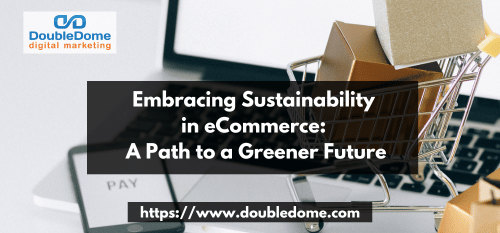By Sonny Day
The concept of sustainability might seem like a distant ideal. But what if I told you that sustainable e-commerce is not just a buzzword—it’s a tangible reality that holds immense potential for reshaping the way we do business online?
Picture this: billions of trees pulped for shipping cartons, mountains of plastic packaging filling landfills, and emissions from delivery vehicles choking the air. This is the harsh reality of traditional e-commerce, where the convenience of online shopping comes at a significant environmental cost.
But there’s hope on the horizon. Sustainable e-commerce offers a beacon of light, illuminating a path toward a greener, more responsible future for online businesses. It’s about integrating eco-friendly practices into every aspect of the e-commerce journey, from sourcing and packaging to marketing and delivery.
So, let’s delve deeper into this transformative concept. Is sustainable e-commerce achievable, or is it merely an elusive dream? In this blog post, we’ll explore the significance of sustainable e-commerce, its benefits for both businesses and the environment, and practical strategies for implementation.
The Significance of Sustainable E-commerce
The rise of e-commerce has undeniably transformed the way we shop, but it has also left a considerable environmental footprint. Shipping emissions are projected to skyrocket, and the sheer volume of packaging waste is alarming. Sustainable e-commerce offers a solution—a way to mitigate these environmental impacts and ensure that our actions today don’t compromise the well-being of future generations.
Moreover, consumers are increasingly driving demand for sustainable options. They’re voting with their wallets, showing a preference for eco-friendly products and packaging. Businesses that fail to adapt risk being left behind in this shifting landscape of consumer preferences.
Benefits of Sustainable E-commerce
Embracing sustainable practices isn’t just the right thing to do—it’s also a savvy business move. Let’s explore some of the compelling benefits:
Environmental Impact: By reducing carbon footprints, minimizing waste, and prioritizing eco-friendly materials, businesses can significantly reduce their environmental impact. Brands like Patagonia serve as shining examples of how sustainability can be integrated into every aspect of operations, from supply chain management to product design.
Consumer Preferences and Brand Loyalty: Today’s consumers are more environmentally conscious than ever before. By aligning with their values and offering sustainable products, businesses can build trust, loyalty, and long-term relationships with customers.
Cost Savings and Efficiency Gains: Going green isn’t just morally commendable—it’s also financially beneficial. Sustainable practices can lead to cost savings, efficiency gains, and even tax incentives for businesses. From renewable energy sources to energy-efficient technologies, there are numerous opportunities for businesses to reduce their environmental footprint while improving their bottom line.
Innovations in Sustainable Technologies
Technology plays a pivotal role in driving sustainability in e-commerce. From AI-driven supply chain optimization to energy-efficient hosting solutions, innovative technologies are paving the way for a more eco-friendly future.
Imagine a world where AI predicts demand, reducing overproduction and waste. Picture data analytics tracking the environmental impact of every product, from sourcing to delivery. These technological advancements aren’t just futuristic dreams—they’re tangible solutions to real-world challenges.
Challenges and Solutions
Of course, the path to sustainable e-commerce isn’t without its challenges. From greenwashing risks to regulatory compliance hurdles, businesses face a range of obstacles on their journey toward sustainability. But with every challenge comes an opportunity for innovation and growth.
Future Trends
Looking ahead, the future of sustainable e-commerce is bright. We’re witnessing a global shift toward collaboration and innovation, driven by a shared commitment to environmental stewardship. As consumer expectations continue to evolve, businesses must adapt, embracing sustainability as not just a trend, but a fundamental value.
Conclusion
Sustainable e-commerce isn’t just achievable—it’s essential. By embracing eco-friendly practices, businesses can not only reduce their environmental footprint but also drive innovation, foster customer loyalty, and secure a brighter future for generations to come.
Are you ready to join the green revolution? Let’s unlock the potential of sustainable eCommerce together. Let our eCommerce specialists help you with your online store. Talk to us today to know more ways to grow your business.









